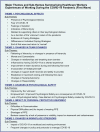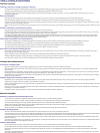Lived experiences of healthcare workers on the front line during the COVID-19 pandemic: a qualitative interview study
- PMID: 35258477
- PMCID: PMC8719006
- DOI: 10.1136/bmjopen-2021-053680
Lived experiences of healthcare workers on the front line during the COVID-19 pandemic: a qualitative interview study
Abstract
Objectives: This study aimed to investigate the presence of perceived stressors, psychological safety and teamwork in healthcare professionals. As the timeframe for this study spanned the first wave of the COVID-19 pandemic, data were captured demonstrating the impact of the pandemic on these factors.
Design: Qualitative interview study.
Setting: All staff working within the emergency and critical care departments of one National Health Service Trust in London, UK.
Participants: Forty-nine participants were recruited using a purposive sampling technique and interviewed when the first wave of the COVID-19 pandemic had subsided.
Main outcome measures: Evaluation of changes in perceived stressors, psychological safety and teamwork in individuals working during the COVID-19 pandemic.
Results: The thematic analysis relating to a participant's lived experiences while working during COVID-19 led to the construction of five key themes, including 'psychological effects' and 'changes in team dynamics'. Several psychological effects were described, including the presence of psychological distress and insights into the aetiology of moral injury. There was marked heterogeneity in participants' response to COVID-19, particularly with respect to changes in team dynamics and the perception of a psychologically safe environment. Descriptions of improved team cohesiveness and camaraderie contrasted with stories of new barriers, notably due to the high workload and the impact of personal protective equipment. Building on these themes, a map of key changes arising due to the pandemic was developed, highlighting potential opportunities to provide targeted support.
Conclusions: Working on the front line of a pandemic can have significant implications for healthcare workers, putting them at risk of psychological distress and moral injury, as well as affecting team dynamics. There is striking heterogeneity in the manifestation of these challenges. Team leaders can use the themes and qualitative data from this study to help identify areas for management focus and individual and team support.
Keywords: COVID-19; accident & emergency medicine; adult intensive & critical care; health services administration & management; qualitative research.
© Author(s) (or their employer(s)) 2021. Re-use permitted under CC BY-NC. No commercial re-use. See rights and permissions. Published by BMJ.
Conflict of interest statement
Competing interests: None declared.
Figures







Similar articles
-
Healthcare staff experiences on the impact of COVID-19 on emergency departments: a qualitative study.BMC Health Serv Res. 2024 Aug 12;24(1):921. doi: 10.1186/s12913-024-11362-9. BMC Health Serv Res. 2024. PMID: 39135193 Free PMC article.
-
Stressors faced by healthcare professionals and coping strategies during the early stage of the COVID-19 pandemic in Germany.PLoS One. 2022 Jan 18;17(1):e0261502. doi: 10.1371/journal.pone.0261502. eCollection 2022. PLoS One. 2022. PMID: 35041679 Free PMC article.
-
Care-home Nurses' responses to the COVID-19 pandemic: Managing ethical conundrums at personal cost: A qualitative study.J Nurs Scholarsh. 2023 Jan;55(1):226-238. doi: 10.1111/jnu.12855. Epub 2022 Dec 4. J Nurs Scholarsh. 2023. PMID: 36464814 Free PMC article.
-
Missing the human connection: A rapid appraisal of healthcare workers' perceptions and experiences of providing palliative care during the COVID-19 pandemic.Palliat Med. 2021 May;35(5):852-861. doi: 10.1177/02692163211004228. Epub 2021 Mar 29. Palliat Med. 2021. PMID: 33775169 Free PMC article. Review.
-
Psychological distress in healthcare workers during COVID-19 pandemic: A systematic review.J Safety Res. 2023 Dec;87:297-312. doi: 10.1016/j.jsr.2023.07.016. Epub 2023 Aug 7. J Safety Res. 2023. PMID: 38081703
Cited by
-
Risk Perception Related to COVID-19 and Future Affective Responses Among Healthcare Workers in Switzerland: A Mixed-Methods Longitudinal Study.Int J Public Health. 2022 Sep 2;67:1604517. doi: 10.3389/ijph.2022.1604517. eCollection 2022. Int J Public Health. 2022. PMID: 36119446 Free PMC article.
-
Lived experience of Jordanian front-line healthcare workers amid the COVID-19 pandemic: a qualitative study.BMJ Open. 2022 Aug 1;12(8):e057739. doi: 10.1136/bmjopen-2021-057739. BMJ Open. 2022. PMID: 35914915 Free PMC article.
-
Voice from the frontline and learning for the future: A qualitative descriptive study on wider perspectives of frontline nurses in India during the COVID 19 global pandemic.Clin Epidemiol Glob Health. 2023 May-Jun;21:101298. doi: 10.1016/j.cegh.2023.101298. Epub 2023 Apr 13. Clin Epidemiol Glob Health. 2023. PMID: 37073375 Free PMC article.
-
The lived experiences of emergency care personnel in the Western Cape, South Africa during the COVID-19 pandemic: A longitudinal hermeneutic phenomenological study.Afr J Emerg Med. 2022 Dec;12(4):410-417. doi: 10.1016/j.afjem.2022.08.004. Epub 2022 Aug 29. Afr J Emerg Med. 2022. PMID: 36062254 Free PMC article.
-
The Wellbeing of Healthcare Workers during COVID-19 Era in Public Primary Health Facilities in Johannesburg, South Africa.Int J Environ Res Public Health. 2024 Mar 20;21(3):372. doi: 10.3390/ijerph21030372. Int J Environ Res Public Health. 2024. PMID: 38541371 Free PMC article.
References
-
- Healthcare in London. Available: https://coronavirus.data.gov.uk/details/healthcare?areaType=nhsregion&ar...
Publication types
MeSH terms
LinkOut - more resources
Full Text Sources
Medical
Research Materials
